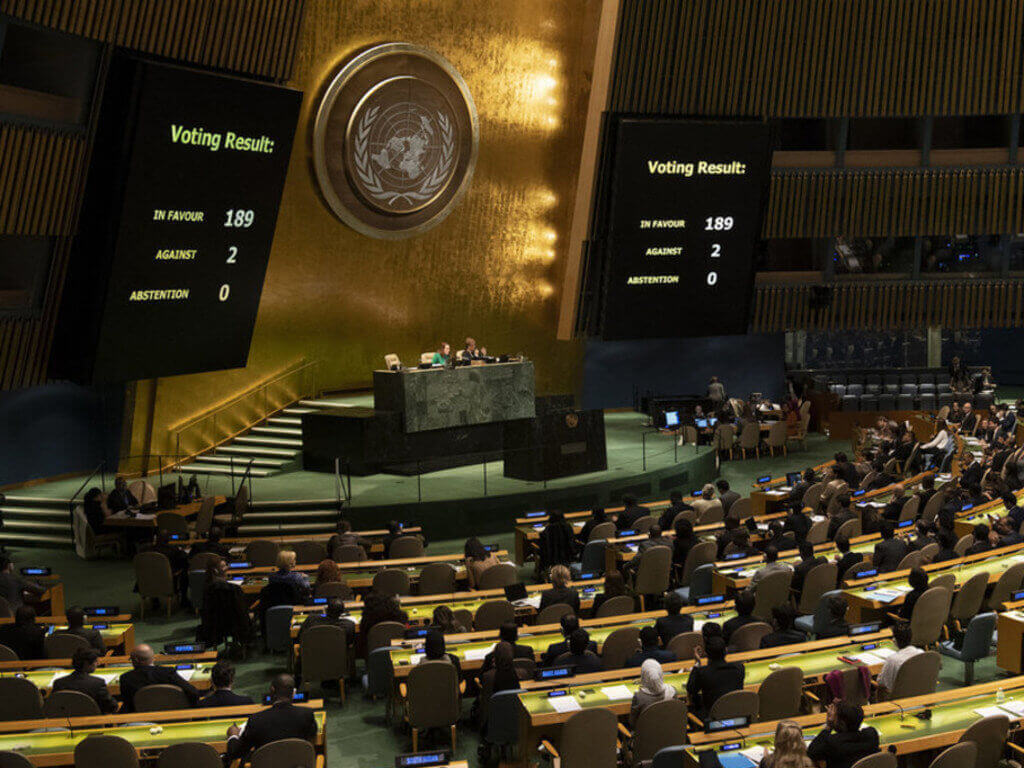For the 29th consecutive year, members of the United Nations General Assembly (UNGA) voted to condemn the United States’ (US) economic blockade on Cuba that first began in 1960 under erstwhile President John F. Kennedy. The resolution was introduced by Cuba and called on the US to bring an end to its embargo on the Caribbean island nation; the motion was passed with 184 votes in favour, 2 votes against, and 3 abstentions.
Notably, the two countries who voted against the resolution were the US and Israel, demonstrating their continued close ties. Meanwhile, three other close allies of the US—Ukraine, the United Arab Emirates (UAE), and Colombia—abstained from voting.
The embargo was first placed in 1960 in response to Cuba’s nationalisation of US-owned oil refineries and was then extended in 1962, and came to resemble one of the key features of the Cold War era. There were indications of an impending shift in US policy in 2016, when the Obama administration abstained on the annual UNGA vote on the matter, marking the first time the US had done so. One year earlier, former president Barrack Obama also removed Cuba from the US’ list of state sponsors of terrorism (SST).
However, under his successor, Donald Trump, the US once again doubled down on its punitive measures against Cuba. In January of this year, the Trump administration once re-added Cuba to the US’ SST list and imposed a host of new sanctions.
At the time, Cuban President Miguel Díaz-Canel described the continued blockade and the new sanctions as “terrorism.” Nevertheless, Cuban officials expressed hope that the Biden administration would undo these moves. In April, when Raúl Castro stepped down from his post as the leader of the country’s Communist Party, he voiced Cuba’s “willingness to conduct a respectful dialogue and build a new kind of relationship with the United States.”
However, White House Press Secretary Jen Psaki has said, “A Cuba policy shift is not currently among President Biden’s top priorities.” Therefore, the US’ decision to vote against Cuba’s resolution in the UNGA comes as no surprise and firmly indicates the Biden administration’s unwillingness to bring about a radical shift in ties with Cuba.
Cuba argues that the blockade amounts to economic coercion and constitutes a human rights violation. Cuban Foreign Minister (FM) Bruno Rodríguez Parrilla told the UNGA: “Like the virus, the blockade suffocates and kills and must end. Homeland or death! We will win.”
Along these same lines, the Cuban FM declared following the vote: “Once again, from the United Nations, the world says no to the aggression and unsuccessful US policies against Cuba,” adding that the result is “a great victory for the Cuban people, for justice, and for truth.”
The US, however, has defended its position, with its chief negotiator in the UN Security Council, Rodney Hunter, saying that the blockade is necessary to push Cuba towards democracy and upholding human rights and freedoms. To this end he remarked, “We recognise the challenges the Cuban people face. That is why the United States is a significant supplier of humanitarian goods to the Cuban people and one of Cuba's principal trading partners.”
Interestingly, just in March, the United Nations Human Rights Council (UNHRC) passed a resolution drafted by Azerbaijan, China, and Palestine on the “negative impact of unilateral coercive measures on the enjoyment of human rights”, in a decision that was welcomed by Cuba. Cuban FM Rodríguez Parrilla at the time described the unilateral sanctions as “illegal and immoral,” and remarked that such measures have inflicted suffering and “hunger” on Cuba for over 60 years.
The US trade embargo is estimated to have cost Cuba at least $9 billion last year alone. As per a report by Amnesty International, sanctions against Cuba have contributed to “malnutrition [...], poor water quality, lack of access to medicines and medicinal supplies, and limited the exchange of medical and scientific information due to travel restrictions and currency regulations.”
Regardless of the latest UNGA vote, however, 29 years of global opposition to US policy on Cuba indicates that Washington is unlikely to be moved by international condemnation or pressure on the matter.

